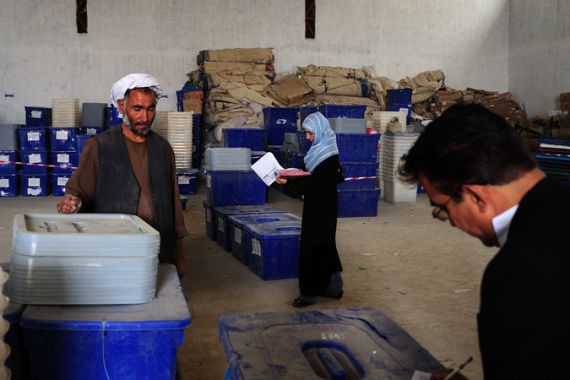Fraud threatens Afghan election
Opposition leader says polls should go ahead despite the wide circulation of fake voter registration cards.

Afghan government officials admit the electoral process is far from perfect as fake voting cards flood the country
Afghanistan’s main opposition leader has said that Saturday’s parliamentary elections should take place despite evidence that thousands of fake voter-registration cards are in circulation across the country.
Speaking to Al Jazeera from Kabul on Thursday, Abdullah Abdullah, who was the main contender to Hamid Karzai in the 2009 presidential election, said: “There are shortcomings in the elections … but this is the only way forward.
“I think at this stage, the only thing that we can do is call on our people to participate in the elections and be observers and monitors [themselves by not buying] fake cards from sources.”
Al Jazeera’s Sue Turton, in an exclusive report from Jalalabad, a city east of Kabul, said the fake cards were being sold across the country for just over 300 Pakistani rupees [roughly $3] each, and were printed in the Pakistani city of Peshawar.
Jalalabad appears to be at the centre of the fake-cards market.
Millions of cards sold
One of the agents selling the professionally made cards told Al Jazeera that his network had sold 1.5 million cards over the past three months.
Fake voter cards are available for about $3 each, as Al Jazeera’s Sue Turton reports from Jalalabad
It is believed that there are many such networks selling the fraudulent cards.
Just about five million people are expected to vote in Saturday’s elections.
If election observers fail to detect these fake cards, the millions of fraudulent ballots in circulation could have a significant, maybe even decisive impact, on the election outcome, our correspondent reported.
In Jalalabad, Farooq Millanay, the local member of parliament and nominee in Nangarhar province, said: “Directly our candidates [are responsible for the printing of these cards], but, indirectly, Pakistan. Pakistan [secret services] want to disturb the elections.”
Concerned about the effect of these cards on his own ballot, Millanay has called for the polls to be postponed.
“This is not democracy,” he told Al Jazeera. “Where is the democracy?”
‘No political will’
Abdullah, the opposition politician, believes that two factors have prevented Afghans from bringing enough reform to the electoral system. First, “there [has been] no political will among the Afghan administration led by Mr Karzai”, he told Al Jazeera.
“And [second], the international community as a whole was not ready to go ahead with massive reform in the electoral system. They thought that as long that there is an election, perhaps we can live with lower standards for Afghanistan, which was not right.”
Last year’s elections in Afghanistan were marred by claims of fraud and corruption, yielding a questionable verdict for Karzai.
In the course of its investigation, Afghanistan’s Electoral Complaint Commission, backed by the UN, found “clear and convincing evidence of fraud” in certain provinces.
Karzai’s campaign spokesman dismissed the allegations of fraud as “rumours”.
Western observers have said they are pleased with the steps taken by the Afghan government to strengthen the independence of the election commission and the decision to announce polling stations a month ahead of time, eliminating much of the confusion that enabled officials to stuff ballot boxes and change tallies in 2009.
“The preparations are miles better than they were last year,” Mark Sedwill, NATO’s senior civilian representative, said.
But a new US watchdog report has warned it will take years to solve certain problems in the electoral system. It cites a lack of a reliable list of registered voters, insufficient candidate vetting and biased electoral organisations.
Security measures
In addition to fraud fears over Saturday’s election, officials are also concerned about security with the Taliban calling for a boycott of the poll and threatening attacks against election targets.
Security concerns have prompted Afghan officials to leave about 300 polling stations closed on polling day.
About 280,000 Afghan police and soldiers protecting the morethan 5,500 voting centres, according to General Mohammad Zahir Azimi, the defence minister.
Last year, there were about 150,000 Afghan forces protecting more than 6,000 voting centres. International forces will play a supporting role _ at the ready to deal with attacks, provide medical evacuations and transport materials.
More than 2,500 candidates are vying for the 249 lower house seats. Afghan laws make it difficult to form political parties, so most candidates run as independents. The winners will serve a five-year term.
Preliminary results will be released as completed, with full preliminary results expected around October 1. Final results are scheduled to be made public from the end of the month, following resolution of complaints of fraud or misconduct.